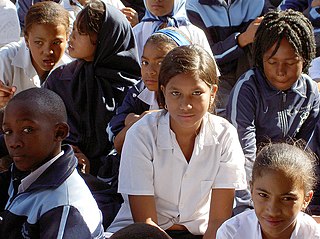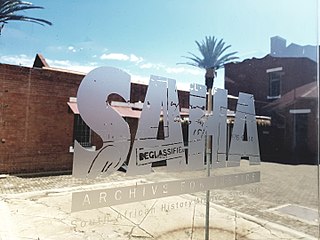
Khayelitsha is a township in Western Cape, South Africa, on the Cape Flats in the City of Cape Town Metropolitan Municipality. The name is Xhosa for New Home. It is reputed to be one of the largest and fastest-growing townships in South Africa.

Education in South Africa is governed by two national departments, namely the Department of Basic Education (DBE), which is responsible for primary and secondary schools, and the Department of Higher Education and Training (DHET), which is responsible for tertiary education and vocational training. Prior to 2009, both departments were represented in a single Department of Education. Among sub-Saharan African countries, South Africa has one of the highest literacy rates. According to The World Factbook - Central Intelligence Agency as of 2019, 95% of the population aged from 15 and over can read and write in South Africa were respectively literate.

Nomaindiya Mfeketo is a South African politician who served as South African Ambassador to the United States from 2020 to 2023, Minister of Human Settlements from 2018 to 2019, Deputy Minister of International Relations and Cooperation, Deputy Speaker of the National Assembly of South Africa from 2009 to 2014, and mayor of Cape Town from 1998 to 2000 and again from 2002 to 2006.

The environmental movement in South Africa traces its history from the beginnings of conservation and preservation groups in the late 19th century, to the rise of radicalism amongst local ecologists and activists. The early environmental movement in South Africa was primarily made up of conservation groups whose membership was dominated by affluent whites. Many of these groups advocated for forms of fortress conservation that were used to justify forcibly removing Black South Africans from their land. Throughout the mid to late 20th century, justice-centered environmental groups sprung up in connection with anti-apartheid movements advocating for change on issues that affected the environment as well as the rights of workers and rural peoples, showing how environmental issues in the country were "inextricably linked to issues of race and politics."

Manenberg is a township of Cape Town, South Africa, that was created by the apartheid government for low-income Coloured families in the Cape Flats in 1966 as a result of the forced removal campaign by the National Party. It has an estimated population of 52,000 residents. The area consists of rows of semi-detached houses and project-like flats, known as "korre". The township is located about 20 km away from the city centre of Cape Town. It is separated from neighbouring Nyanga and Gugulethu townships by a railway line and Nyanga Junction to the east and from Hanover Park by the Sand Industria industrial park to the west and Heideveld to the north. The northern part of Manenberg,(closest to Phillipi and Edith Stevens wetland nature reserve)is known as Sherwood Park ,here, in the past live many wealthy people of both Christian and Muslims descent,sadly all this changed.The middle and lower class live in Manenberg.Poverty, unemployment,lack of education and motivation,coupled with drug abuse/addiction,gang activities ,social injustice and racial profiling are some of the major issues people in Manenberg suffer under.

Barry Streek was a liberal South African political journalist and anti-apartheid activist.
Nadia Davids is a South African playwright, novelist, and author of short stories and screenplays. Her work has been published, produced, and performed in Southern Africa, Europe, and the United States. She was a Philip Leverhulme Prize winner in 2013. Her play What Remains won five Fleur du Cap Theatre Awards. In 2017, Davids was elected president of PEN South Africa.
The South African Liberal Students' Association (SALSA) exists to unify liberal student organisations across South African campuses. SALSA is the ideological descendant of the South African Liberal Association (SALA) (1936–1968), the first non-racial political organisation in South Africa, gathering many of its liberal principles and goals in its founding constitution. SALSA is a student organisation which is not aligned with any political party; and which believes in, practices and promotes the principles of liberal democracy on campuses.

The Amy Biehl Foundation Trust was the organization established in Cape Town, South Africa by Linda and Peter Biehl commemorate their daughter Amy Biehl, a white American anti-apartheid activist who was killed by a black mob during racial violence in South Africa in 1993.
People Against Suffering, Oppression and Poverty (PASSOP) is a community-based, grass roots non-profit organisation fighting for the rights of asylum seekers, refugees and immigrants in Cape Town, South Africa.
Self Help Africa is an international charity that promotes and implements long-term rural development projects in Africa. Self Help Africa merged with Gorta, in July 2014, and was known for a period as Gorta-Self Help Africa. In 2021, the organisation merged with the UK-based international non-governmental organization (INGO), United Purpose. Self Help Africa also owns a number of social enterprise subsidiaries - Cumo Microfinance, TruTrade and Partner Africa.

Elizabeth Dipuo Peters is a South African politician who is the Deputy Minister of Small Business Development of the Republic of South Africa from 7 March 2023. She was previously the Minister of Transport from 10 July 2013 until 30 March 2017, in the Zuma administration, and former Minister of Energy from 2009 to 2013 having served as successor to Manne Dipico as the second Premier of the Northern Cape Province, 22 April 2004 to 10 May 2009. A member of the African National Congress (ANC), she serves on the Women's League National Executive Committee. Dipuo Peters resigned as a member of parliament for the African National Congress in April 2017.
The 21st Century Leaders, founded in 2003, was established by Charlotte di Vita MBE, who served as a Goodwill Ambassador for the Nelson Mandela Children’s Fund. The 21st Century Leaders programme was launched by Trade plus Aid, British Charity Registration 1061376. Trade plus Aid is an ethical trading organisation established in order to create environmentally sound and economically viable means to alleviate poverty in impoverished communities, initially in Africa.

The Nelson Mandela Children's Fund (NMCF) is a charitable organisation founded by Nelson Mandela, based in South Africa. Its mission is to help individuals from birth to age 22.
The Desmond Tutu TB Centre, also referred to as the DTTC or Desmond Tutu Tuberculosis Centre, is a research facility committed to raising awareness about tuberculosis and providing medical treatment and solutions to TB patients in South Africa. Founded in 2003 by Professor Nulda Beyers as the Centre for Tuberculosis Research and Education, the centre came under the patronage of Archbishop Desmond Tutu, Archbishop of South Africa and former TB survivor and, in 2005, changed its name to reflect the event. Since then, the DTTC has worked alongside Desmond Tutu to combat the health issue of TB in South Africa. It is currently directed by Professor Beyers.
Livity Africa is a non profit organisation with offices in Cape Town and Johannesburg. Launched in 2011, Livity Africa publishes the Live Magazine SA, a nationwide youth‐run media channel that helps springboard young people into full‐time paid employment.

Community House situated in Salt River, Cape Town is a unique and historic site of living heritage. It has always been known as a site of activism from around the mid-1980s which has shaped and continues to shape the socio-political landscape of its extended communities. The building itself houses NGO's and Trade Unions as well as a labour and community history museum centered on the Trade Union Library and its archive. It presently houses twenty-four organizations that focus on labour research, popular education, gender advocacy, HIV/AIDS education, environmental issues, youth development, media production and union organization.
LEAP Science and Mathematics Schools or LEAP Schools is a collection of eight low-fee secondary education schools in four provinces in South Africa. The first LEAP school opened in 2004 in rented premises in Observatory, Cape Town and mainly served the township of Langa. LEAP is an independent school mainly funded by small parent contributions, South African Corporates with limited subsidies from the Department of Basic Education.

Book fairs and literary festivals are held throughout South Africa each year to promote literacy among children and adults. A country's literacy rate is often a key social indicator of development. In 2005, UNESCO Institute for Statistics reported a literacy rate of 94.37% among the population aged 15 years and older. The literacy rate among the male population in this age group was 95.4% and 93.41 for female counterparts. According to Statistics South Africa, functional illiteracy among those aged 20 years or older, was recorded at 15.4% in 2005. This has improved from 2002's 27.3%. Women are more likely to be functionally illiterate across all age groups, apart from those aged between 20 and 39 years old.

The South African History Archive Trust, better known as SAHA, is an independent archive dedicated to documenting, supporting and promoting greater awareness of past and contemporary struggles for justice through archival practice, outreach, and the utilisation of the Promotion of Access to Information Act, 2000 (PAIA). SAHA was founded in the 1980s as increasing state censorship in South Africa threatened to obscure the struggle against human rights violations and the oppressive political regime of apartheid. Since 2022, SAHA has been based at the Wits University after a 10-year relocation to Women's Gaol Museum, Constitution Hill where it took over responsibility for archiving the Constitution Hill Trust records in addition to its original collection.












